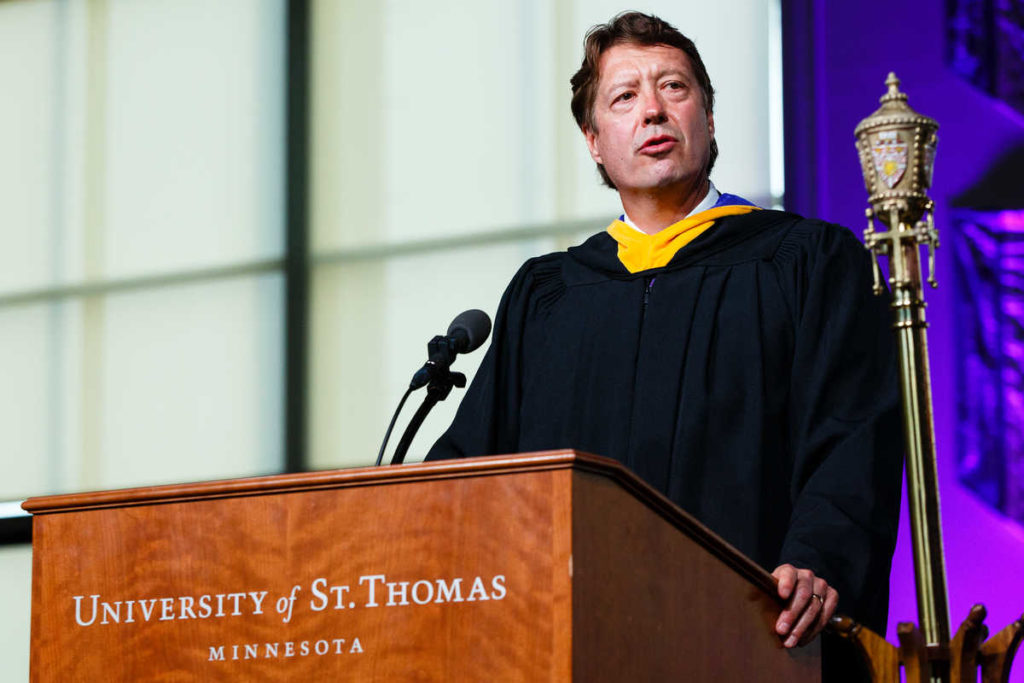When it comes to the Board of Trustees, St. Thomas relies on its members for their insights, expertise and guidance. But the relationship between board members and the university community is also symbiotic. Just ask Archie Black, CEO of SPS Commerce.
Black, who joined the board in 2018, has been an ardent supporter and outright champion for St. Thomas and its many initiatives. Whether it’s the Opus College of Business, the Racial Justice Initiative, or the Dougherty Family College, his position is as clear for them as it is for all the new and emerging priorities enumerated in the St. Thomas 2025 strategic plan unveiled this week.
“I am obviously very supportive of the St. Thomas 2025 plan, and having well rounded, educated students coming out of St. Thomas is very important for our business,” he said. “We’ve hired a lot of them.”
An emphasis on education
The Minneapolis-St. Paul business community recognizes that it needs to support universities and its students in order to build an educated pipeline to its doors. Minnesota has one of the worst educational achievement gaps in the country, despite consistently ranking as one of the highest-performing states when it comes to educational quality. In an era when fewer students are heading to college (higher education across the nation has seen a drop in student enrollment every year for nearly the past decade, with one of the deepest drops during the 2020-21 school year due, in part, to the pandemic) companies such as SPS Commerce are committed to seeing the success of college enrollees, as well as making sure that more prospects receive the financial support to attend and graduate.
Reaching this goal is one of the reasons Black supports the St. Thomas 2025 strategic plan, which calls for an increase in experiential opportunities for students and provide stronger lifelong career outcomes for St. Thomas graduates by strengthening employer and community partner relationships for a broader, more diverse student body.
My personal passion on the giveback side of the world is education,” said Black, who this year will mark his 20th year as CEO of SPS Commerce, a role he assumed after joining as senior vice president and chief financial officer in 1998.
“I grew up upper middle class, at least in Minnesota, and one of the challenges we have in Minnesota is people don't understand that 49 states do a better job of educating their Black population than the state of Minnesota.”
Hiring for the future
It’s not just graduates SPS Commerce hires, but also interns. There are currently four students from the Dougherty Family College interning at the publicly traded technology company. In addition to the real-world experience the students gain, contributing to the students’ learning is rewarding for Black, and a part of his personal mission.
“Corporate partners, such as SPS Commerce, make the goal of providing our scholars with paid internships, professional skills, occupational knowledge, networking opportunities and a vision for their future possible,” said Buffy Smith, interim dean for the two-year, degree program that helps students transition to a four-year college. She said the experience “guides scholars toward a meaningful professional career where they can develop into transformative community leaders.”
The Minneapolis-based SPS Commerce, which has the largest retail network, connecting 90,000 businesses across the globe to improve trading partnerships for suppliers, retailers, distributors and grocers, was one of the founding sponsors of the Dougherty Family College. What attracted Black to the college was DFC’s mission to find a pathway for students who might not otherwise have the financial means to attend college.
Knowing that there are talented people who some employers might not hire because they lacked a college diploma, drives Black to contribute what he can to seeing to it that more people receive a financial leg up to obtaining their dream.
There is an authenticity in Black’s commitment. When he learned several years ago that first-year employees of a company SPS Commerce purchased in Ukraine were making $300 a month, he was taken aback and wondered how they could live on those wages. Well, although cost of living is lower in Ukraine, Black learned that day that if the employees were earning more than double, they could have a real decent living. As a result, he immediately increased the pay of all that branch’s employees to $800 a month.
“It was not a lavish life, but a decent life,” said Black, who six years ago received from St. Thomas the Dean’s Medal of Excellence for his role building a business culture that serves as an incubator for the next generation of technology leaders.
Black made the decision to up the salaries because it was the right thing to do. But one lesson Black learned early in life is that with good deeds come rewards. “Our recruiting went through the roof, our culture drastically changed and our productivity skyrocketed.”
Prioritizing diversity, equity and inclusion
Back at headquarters, Black also has made a commitment to increasing the racial diversity of his staff, as well as obtaining a parity for women -- two demographics that historically have not found themselves rising through the ranks of STEM careers. Looking around at the number of women in leadership and women on the board at SPS Commerce and throughout the company, his work is evident. The reason why, Black said, “is because we’re intentional.”

Black, who said he has also always strived to increase racial and ethnic diversity at SPS Commerce, which has had 80 straight quarters of increased revenue since he became CEO, now aims for the company to be very intentional about breaking down barriers.
“We've always leaned into diversity, equity and inclusion, but I think we really doubled down and became more focused and more specific,” he said. “We're not moving away from any other group, but we're being very, very focused on reducing systemic racism for Blacks within SPS Commerce and within our communities.”
The increased focus on antiracism efforts as it relates to the African American community came about after the killing of George Floyd in Minneapolis in May 2020. As a result, SPS Commerce named reducing systemic racism as one of its strategic initiatives.
Not one too shy to ask for help when he needs it, Black turned to President Julie Sullivan, whom he considers a friend.
“I told Julie, ‘I’m really struggling with this. I don't want a bunch of training, I need some education.’ She put me in touch with Dr. [Yohuru] Williams and, you know, he liked what he was hearing from us, what our approach was.”
Williams, who is the Distinguished University Chair and Professor of History and founding director of the Racial Justice Initiative at the University of St. Thomas, led like an educator. He gave the SPS Commerce leaders homework to do before his first meeting with them. For one, Williams requested that they watch “Jim Crow of the North,” which looks at the historical roots of racial injustice for African Americans in Minnesota. The documentary focuses on how restrictive housing covenants after the turn of the last century continues to have lasting impact on the economic disparities between Blacks and whites in the Twin Cities today.
Black said the information was eye-opening. Growing up in Minnesota during a time when the African American population was less than two percent, he didn’t learn much in school in the way of Black history.
“You might get like five minutes on Rosa Parks, and when that was done it was kind of like, ‘Well, we fixed that one. Now you can ride on the bus,’” Black said, sounding exasperated. “Well, we're not quite there yet. I mean riding on buses is a positive step forward, it needs to happen, but there's a lot more steps.”
And again, that’s why Black is collaborating with Williams and the Racial Justice Initiative.
“What the Racial Justice Initiative has allowed me the opportunity to do, and the platform to do, is to go out and do that work with corporations, with community organizations, with educators to get them in the mindset of understanding what that history is and then once you understand that history, how to take action,” said Williams.
Williams and Black are on the same page in that antiracist training of an hour and a half or half a day is not the answer. It’s ongoing education that is needed.
“The conversation we have from the beginning with anybody who we work with, is it's got to be longitudinal engagement,” said Williams. “This is a process and it's going to be longitudinal engagement between me and whatever organization that we work with.”
Making an impact
When Black delivered the commencement address to the 2015 graduating class of the Opus College of Business, he said, “You can’t do it alone (and why would you want to).” Black advised the promising MBA graduates to find mentors and supporters willing “to challenge you and tell you the truth.”
As a pioneer of cloud computing, Black doesn’t dish advice that he wouldn’t heed himself. He also told the Class of 2015, “Collaboration requires trust and a willingness to ask for help.” Success always comes with help – whether it is from family or colleagues, he noted. “Seek out people who think differently. You can learn something from each and every person you meet.”
In helping his staff to think and act more intentionally, SPS Commerce gave every employee $100 to spend on Black-owned businesses -- that was 1,100 people who were challenged to give back to their communities in this way.
One business recipient Black mentioned was Junita’s Jar, whose packaged treats can be found in the aisles of some Whole Foods stores, but they also provide corporate and individual gift baskets through online sales.
Owner Junita Flowers, who has spoken at St. Thomas for the social entrepreneurship program with the Schulze School of Entrepreneurship, said, “One of the things that got me through [the loss of income from] the pandemic and George Floyd’s murder was that his company gave all of their employees $100 to spend with Black-owned businesses for Juneteenth and my business popped up in some of their circles.”
When Black joined the board in 2018, he said, “I appreciate the diversity in our world and the value of inclusivity in supporting the unique contributions of each individual. And I believe that when you build a culture of caring and acknowledge the achievements of people, good things happen and that impact ripples out far beyond our own walls.”
Read about and watch Black's First Friday talk with Williams from Nov. 6, 2020.







